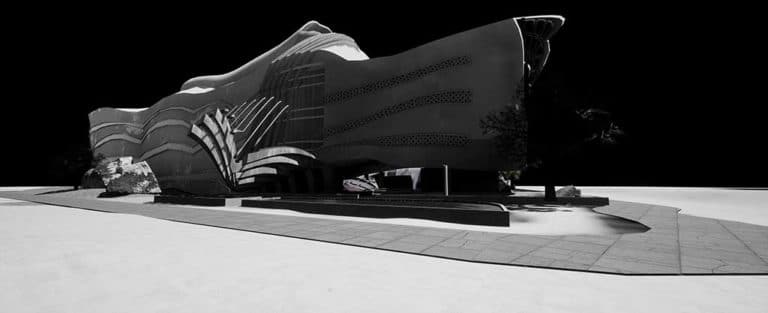For the 14th edition of Sharjah Biennial (SB14) Shezad Dawood’s newly-commissioned project Encroachments takes a pragmatic and oblique look at the relations between Pakistan and the US since partition in 1947 through a new Virtual Reality environment, contained within two mirrored installations comprising: neon, wallpaper, tapestries, sculpture and print.
Shezad Dawood Encroachments – Production stills (2019) VR environment, duration variable, co-commissioned by Sharjah Art Foundation – SB14, 2019 and New Art Exchange, Nottingham. Generously supported by the Bagri Foundation. Courtesy of the artist, Jhaveri Contemporary, Mumbai and Timothy Taylor, London
The narrative behind Encroachments is a meditation on the idea of sovereignty, private property and the politics of space in the 2 largest cities in Pakistan (Lahore & Karachi). The term Encroachment is used to designate the backlash in Pakistani politics and the media against so-called illegal structures built onto the fabric of existing private and state infrastructure. These ad-hoc encampments become social and commercial apparatuses for the lower classes, and reflect a grass-roots entrepreneurialism, and reclamation of space.
Austrian-American Modernist architect Richard Neutra was selected to make the proposed US embassy in Karachi, and construction began in 1959. However, by the time it was completed the capital was moved to the new city of Islamabad, and Neutra’s building was downgraded to a Consulate.
The central element of the VR is the building itself. But on the journey there and onwards, the user passes through various parallel environments, including renowned colonial-era bookshop: Ferozsons in Lahore, established in 1894, which resembles a maze game, before giving way to a secret passage into the Reagan years and a video game arcade that makes reference to anti-Soviet propaganda that fuelled a large amount of early game design evolving against the backdrop of the Soviet-Afghan war.
Each scene is punctuated by a different key track from the unique niche music scene that developed in the late 60s in Pakistan, as local bands made up of mixed Muslim and Christian musicians drew parallel inspiration from classical Indian ragas and the layers of sound pioneered by both Phil Spector and Brian Wilson. Dawood has been collecting anecdotes from several of the original band members (of bands such as The Panthers and The Fore Thoughts), in order to gain a better insight into this polyglot generation, and the alternative possibilities it proposes.
The VR is staged within an environment wallpapered with digital terrazzo patterns created by the artist, to riff off the ubiquitous use of low-grade terrazzo in Pakistan, which features as the flooring in both Neutra’s consulate and was commonplace in Pakistani gaming arcades of the 1980s. And to play further with this juxtaposition of interior and exterior space, the other elements are hung on the wallpaper and comprise: tapestries, neon and an imagined band poster from a teenage Karachi bedroom of the 1960s.
Encroachments is co-commissioned by Sharjah Art Foundation for SB14, 2019 and New Art Exchange, Nottingham. Generously supported by the Bagri Foundation. Special thanks to Jhaveri Contemporary, Mumbai, Timothy Taylor, London and EMI Pakistan. Encroachments will travel in an expanded form to New Art Exchange, Nottingham in January 2020.
About Shezad Dawood:
Shezad Dawood works across disciplines to deconstruct systems of image, language, site and narrative. Using the editing process as a method to explore both meaning and form, his practice often involves collaboration and knowledge exchange, mapping across geographic borders and communities. Recent solo exhibitions include: Leviathan, Mostyn, Wales, and A Tale of a Tub, The Netherlands (2018); Leviathan, Fondazione Querini Stampalia, Venice (2017); Timothy Taylor, London (2016); Galerist, Istanbul (2016); Pioneer Works, Brooklyn (2015); Fig.2 at the ICA studio, London (2015); Parasol Unit, London; Leeds Art Gallery and OCAT Xi’an, China (all 2014), Modern Art Oxford (2012). And group exhibitions include: the Gwangju Biennial (2018); Kiran Nadar Museum of Art, Delhi (2018); Rubin Museum of Art, New York (2018); The Drawing Room, London (2017); Mori Art Museum, Tokyo (2016); Taipei Biennial (2014), Marrakech Biennial (2014), MACBA Barcelona (2014).
About Sharjah Art Foundation:
Sharjah Art Foundation is an advocate, catalyst and producer of contemporary art. Through the Sharjah Biennial, the annual March Meeting, year-round exhibitions, film and music programmes, education and community outreach programmes, grants, residencies, commissions and publications, the foundation encourages a shared understanding of the transformational role of art.
About New Art Exchange:
New Art Exchange (NAE) is a contemporary arts space in Nottingham that celebrates the region’s cultural richness and diversity. It is the largest gallery in the UK dedicated to culturally diverse contemporary visual arts and their programme of activities – comprising exhibitions, tours, public engagement, learning, talent development and international projects – are dedicated to stimulating new perspectives on the value of diversity within art and society. NAE’s distinct agenda is shaped by the organisation’s neighbourhood setting and NAE draws inspiration from the experiences, histories, perspectives and needs of their local BAME communities. As such, NAE endeavours to creates accessible programmes that are meaningful locally, yet nationally relevant, through the work of both emerging and world renowned British and international artists. To date, amongst others, these have included Hurvin Anderson, Zarina Bhimji, Nikhil Chopra, Hetain Patel, Larissa Sansour, Sonia Boyce, Rashid Rana, Zineb Sedira, Zanele Muholi, Mahtab Hussain, Doug Fishbone, Akram Zaatari and John Akomfrah. www.nae.org.uk
About Bagri Foundation:
The Bagri Foundation is a UK registered charity, inspired by creative, unique and unexpected ideas that weave the traditional and the contemporary of Asian culture. The Foundation is driven by curiosity, a desire to learn and supports myriad of exciting artistic programmes that challenge, engage and inspire. Through a diverse programme of film, visual arts, music, dance, literature, courses and lectures, Bagri Foundation gives artists and experts from across Asia, or those inspired by the continent, wider visibility on the global stage.
Find out more here: https://www.bagrifoundation.org/
For further information please contact Miranda Sharp on +44 7970 260 959 miranda@shezaddawood.com


